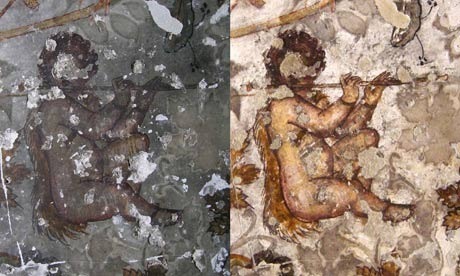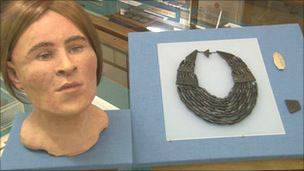Michelle Moran's Blog, page 77
August 23, 2010
Discovery of ancient cave paintings in Petra stuns art scholars

Detail of a winged child playing the flute, before and after cleaning. Photograph: Courtesy of the Courtauld Institute
Spectacular 2,000-year-old Hellenistic-style wall paintings have been revealed at the world heritage site of Petra through the expertise of British conservation specialists. The paintings, in a cave complex, had been obscured by centuries of black soot, smoke and greasy substances, as well as graffiti.
Read the rest on The...Dig unearths insight into life before the Romans
 The Big Dig 2010 at Brading Roman Villa. Picture by Robin Crossley.
The Big Dig 2010 at Brading Roman Villa. Picture by Robin Crossley.THE third phase of the Big Dig at Brading Roman Villa may well have been one of the toughest excavations eminent archaeologist Sir Barry Cunliffe had ever undertaken but it has yielded some treasures and a greater understanding of Brading's history up to its Roman occupation.
Read the rest here.
August 20, 2010
Queen of the Inch to be re-interred

A reconstruction of the queen's head and the necklace are on show in Bute
A 4,000-year-old skeleton, known as the Queen of the Inch, is to be re-interred in the tiny island of Inchmarnock in the Firth of Clyde.
Read the rest on the BBC.Disease killed soldiers from Oliver Cromwell's army discovered in Fishergate
ARCHAEOLOGISTS have revealed how they discovered more than they bargained for when a York excavation unearthed the remains of a "forgotten" army's soldiers.
August 18, 2010
Did Boudica live near Norwich?
DAN GRIMMER
[image error]Dr Will Bowden with the skeleton discovered at Caistor St Edmund during the last excavations. Archaeologists are set to unearth further secrets of a Roman town on the outskirts of Norwich - and are hoping to discover evidence linking the settlemt to East Anglia's Iceni queen Boudica.Read the rest here.
'Mitochondrial Eve': Mother of All Humans Lived 200,000 Years Ago
ScienceDaily — The most robust statistical examination to date of our species' genetic links to "mitochondrial Eve" -- the maternal ancestor of all living humans -- confirms that she lived about 200,000 years ago. The Rice University study was based on a side-by-side comparison of 10 human genetic models that each aim to determine when Eve lived using a very different set of assumptions about the way humans migrated, expanded and spread across Earth.
Statues older, more numerous than terracotta warriors found in Hunan
Read the rest here.
August 17, 2010
Major buildings find at Roman fortress of Caerleon
Archaeologists have discovered several large buildings at the fortress of Caerleon in south Wales, one of Britain's best known Roman sites.
Mysteries Abound in WTC Ship Remains
by James Williams
On July 12 the remains of an 18th-century ship were found buried 20 feet below street level at the site of the World Trade Center in New York City. The question is -- how did they get there?
Read the rest on Discovery.Ancient temple complex discovered near Le Mans
Excavations near the antique city of Vindunum (now Le Mans) have revealed a vast religious site dating from the first to the third centuries AD with remarkably well-preserved offerings.
Read the rest on The Guardian.


